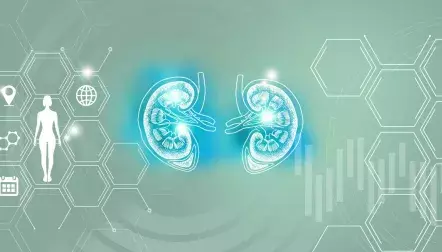


Understand the reasons behind your kidney disease. By learning the cause of your kidney disease, you'll be able to make informed decisions and work with your healthcare team to create a personalized plan to manage your health.


Understand the reasons behind your kidney disease. By learning the cause of your kidney disease, you'll be able to make informed decisions and work with your healthcare team to create a personalized plan to manage your health.


"I know firsthand that kidney disease can happen at any age, and sometimes the cause of your disease isn’t clear-cut. But I want to encourage others to be informed about their kidney health and self-advocate for a treatment plan that can allow them to live their best life." - Suni Lee

Knowing the cause of your kidney disease can help:
Slow the damage from kidney disease: If your care team knows what is causing your kidney disease, they can work to slow it down and treat the cause.
Guide family planning: Knowing if your kidney disease has a genetic cause can inform your decisions about family planning and seeking health care for future children.
Access to clinical trials: After getting your complete diagnosis, find out if you qualify to take part in a clinical trial.
Protect your transplant: Knowing the cause of your kidney disease can help your doctors know which treatments may or may not help you.
Protect your overall health: When your kidneys do not work as well as they should, you have a higher chance of having other health problems.
Peace of mind: You may feel some sense of relief from finding out what is causing your kidney disease.
The leading cause of kidney disease is diabetes; other important common causes include high blood pressure, genetic diseases, glomerular diseases, and cystic diseases.
When you have diabetes, the body can’t use insulin properly, leading to high blood sugar levels. High blood sugar can hurt the small blood vessels in the kidneys, causing diabetic kidney disease.
Hypertension, commonly known as high blood pressure, is a common cause of kidney disease. The kidneys play a crucial role in regulating blood pressure, but when your blood pressure is high for a long time, it can damage the blood vessels of the kidneys. Over time, this damage can decrease the kidneys' ability to filter waste and fluid from the blood.
Your healthcare team can help you find the cause of your kidney disease. Use this tool to build a unique conversation starter to bring to your next doctor's appointment.


Beyond diabetes and hypertension, there are other causes of kidney disease. Some forms of kidney disease are related to your genes, can be caused by infections, or can be a result of autoimmune disease. Explore other causes of kidney disease and find support for living with rare types of kidney disease.
Some people get kidney disease or have sudden kidney failure even though they do not have other health conditions or risk factors known to cause it. Your doctor may call this kidney disease of an "unknown etiology". This means that your health care team does not know why you have kidney damage. Learn more about kidney disease of unknown cause.
There are also other problems that can affect the kidneys. These include kidney stones, kidney infection, nephrotic syndrome, and certain cancers.
As a caregiver, you are a vital part of the care team. These resources can help you take care of your loved one and yourself.
A clearer diagnosis helps your loved one get the right care. This guide helps caregivers learn how to speak up during appointments, understand the causes of kidney disease, and work effectively with their care team.
When you're constantly focused on someone else's needs, it's easy to lose sight of your own. This guide helps caregivers notice the warning signs of burnout and provides practical tips for rest, self-care, and stress relief, along with providing advice on reaching out for help and support resources.
Each type of kidney disease affects the kidneys and the body in different ways. The diagnosis, treatment, and management of kidney disease can vary greatly depending on the specific condition.
Rare kidney diseases include a range of conditions that can affect your kidneys. These conditions can be caused by genetic mutations (changes), autoimmune disorders, or environmental factors.
Kidney disease of an unknown cause means that your health care team does not know why you have kidney damage.

Your doctor will do blood and urine tests to measure how well your kidneys are working and diagnose kidney disease. To determine the cause of your kidney disease your doctor may do advanced testing such as:
Ask your doctor about unexplained symptoms and more advanced testing if you've had urine and blood tests but still don't have your complete diagnosis. You can also download our guide for more support in diagnosing the cause of your kidney disease.

Take action to learn more about kidney disease and prevention

Access resources to help identify and reach your kidney health goals